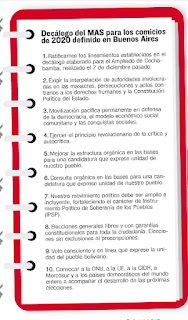Using LAPOP data, Dinorah Azpuru gives us bad news on her Washington Post piece on Latin American protests and democracy.
My research, based on survey data from 2019, shows that in the countries that have had the most serious turmoil in recent weeks, citizens display moderate levels of support for democracy — and high levels of dissatisfaction with its performance. Further, in those countries, the public has only meager trust in important democratic institutions, especially political parties.
People are unhappy about the economy, personal security, and corruption. And it gets worse.
Interestingly, Latin Americans trust the military more than other institutions, with 55 percent trust in 2019. But of course, the military is not an elected body. What’s especially important is that the gap in Latin Americans’ trust in the military and in institutions of representative democracy has been growing. In a region where not long ago, authoritarian military regimes governed with an iron fist, this could spell trouble for democracy. We have already seen that in many countries, the military can still be the final arbiter of political change.
For me, this is the essential point. Despite Bolivia's history of coups, Evo Morales had seemed adept at keeping the military on his side. The presidents of
Ecuador and
Peru felt compelled this year to appear in photos with their military leadership as a sign of political stability. Chilean president
Sebastián Piñera surrounded himself with military officials as he made the ridiculous claim that he was "at war with a powerful enemy."
It's not just that the elected leadership turns to the military, though, it's that many people in the country still consider that a perfectly legitimate option, and they trust the military. As Dinorah shows, 55% of Latin Americans have confidence in the military, compared to 30% in the legislature and 17% in parties.
Now, simply having confidence in the military does not necessarily mean support for military political intervention. But as a minimum it is suggestive of that, which is a bad sign for democracy. In the past decade, we've seen quite a few unscheduled changes of government, from the fishy (Paraguay and Brazil) to clear examples of coups (Bolivia and Honduras), not to mention public calls for a coup (Venezuela) and instability that led to discussion about whether a coup attempt occurred (Ecuador). All the while we debate about whether instability is actually a "coup," it's easy to lose sight of the fact that the military's political role is entirely normalized.
Given the amount of unrest this year, it is unlikely 2020 will be free of a strong military political role.
Read more...





